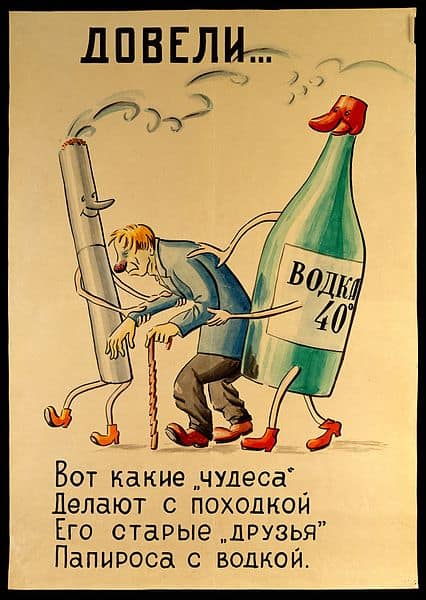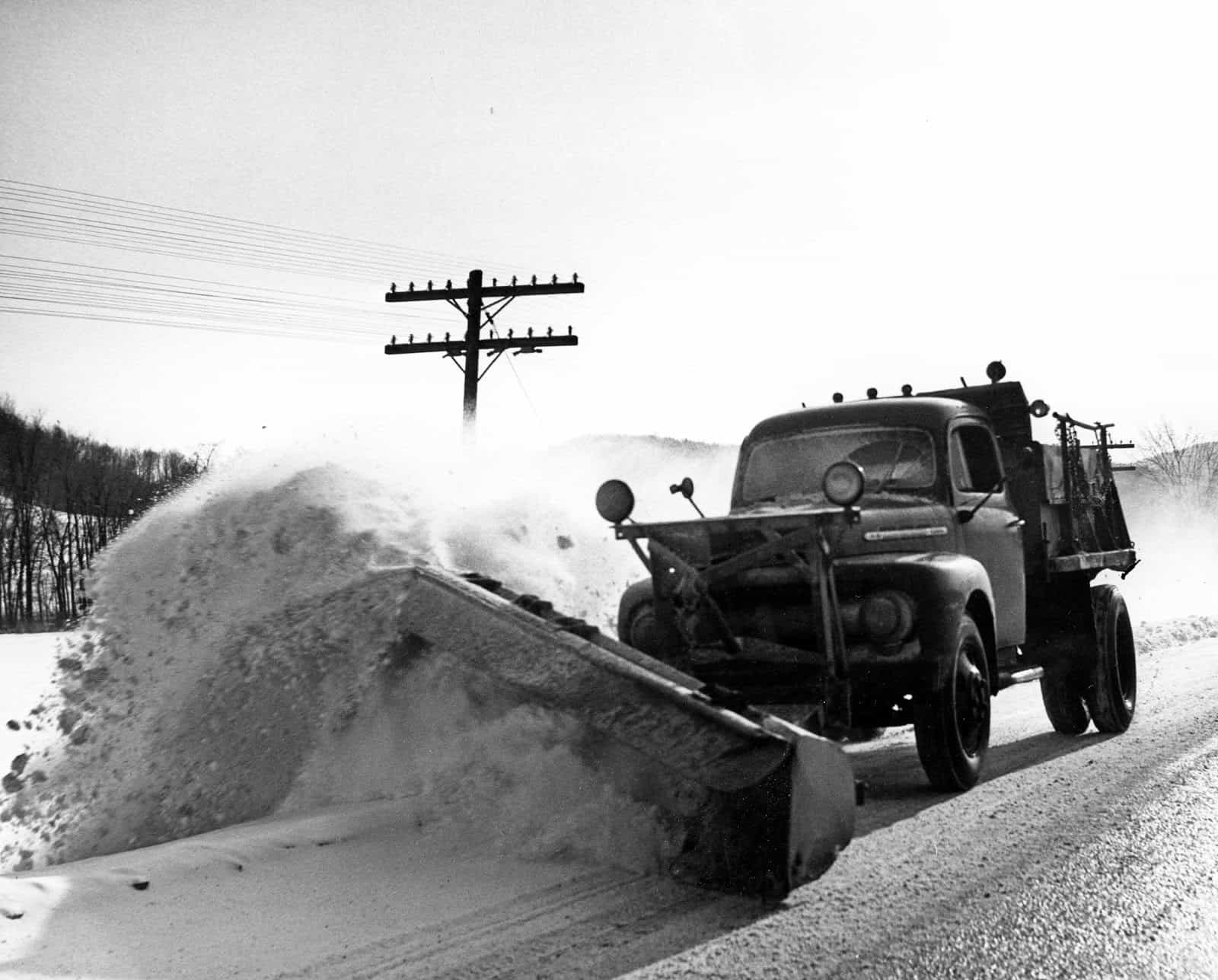The currency of Soviet Russia was the ruble—or was it? When General Services Officer Robert Weisberg was posted to the U.S. Embassy in Moscow in 1984, he found out first-hand that things sometimes get done a little faster with a few cartons of cigarettes and bottles of vodka.
In a winter with heavy snowfall, it fell on Weisberg to put the embassy in top shape, which meant finding ways to get the snow cleared daily. When workmen didn’t complete the job, he learned quickly how things really got done in Moscow—making deals to overcome the inefficiency that often plagued the USSR at the time. By exchanging vodka and cigarettes that he purchased on his own for the snow-clearing labor the embassy needed, Weisberg was able to leverage the Soviet system to accomplish the mission.
Under the USSR’s communist economic system, high-demand consumer goods were difficult to secure. Soviet central planning was endemic with false reporting, which led to underproduction and severe shortages of some consumer goods. Out of necessity, unofficial barter and exchange systems developed to fill in the gaps. Commodities, like cigarettes, could be valuable tools in the network of favors that operated outside of the parameters of the official economy—so Moscow’s workmen were eager to trade.
Robert Weisberg experienced a dramatic change going from Bombay, India (his first post) to Moscow. A career member of the Foreign Service, he went on to serve abroad in Italy, Switzerland, Kyrgyzstan, Norway, Poland, Venezuela, Indonesia, and Finland. Ultimately, Weisberg served as U.S. Ambassador to the Republic of Congo before retiring in 2008 with the rank of Minister Counselor.
Robert Weisberg’s interview was conducted by Charles Stuart Kennedy on November 27, 2012.
Read Robert Weisberg’s full oral history HERE.
Drafted by Natalie Friend
“I went from king to garbage overnight.”

A Dramatic Shift:
Q: Well then, where were you pointed towards after you left Bombay?
WEISBERG: Moscow.
Q: At last, huh?
WEISBERG: Well, I’d visited before. I hadn’t been there in 15 years. . . . I went there as a baby GSO (general services officer). Lowest of the low. . . . I went from king to garbage overnight. You know, vice consul in India, you’re like two ranks over God. Baby GSO in Moscow, you’re better off being on a chain gang in Mississippi. I never, never was yelled at and treated that way by—it was incredible the way the American community took shots at you being a GSO. It’s amazing. I actually shut off. I didn’t want to talk to anybody. And I used to go home in this tiny apartment my wife and I had and I’d put on these Clint Eastwood movies and I’d tell her, “Just stay away from me for an hour.” Disgraceful.
Q: Was there something endemic about it or what?
WEISBERG: Well, no. I mean for these guys coming out to the Soviet Union, pretty bad housing, not a fun place. And particularly—I mean everybody—I wouldn’t single out any other agency. And I kept telling them, I said, “You’re not in Kansas anymore.” I mean this is hard to get this stuff done. . . . I mean what I would have given for a True Value Hardware Store or something. And the cars didn’t work and this didn’t work and that. And it was just awful. And the philosophy of the admin counselor on down was, “Well, you just got to roll with it and we don’t want anybody to fight back here.” And I thought well, this, this is terrible. I mean I’m an educated person, I’m a Foreign Service Officer. . . . But I always learned from everything.
Q: Well, did you see any improvement over time?
WEISBERG: Second year, things got better. . . . my work was such that I, I was able to stay with the American community more. I was doing renovations to the apartments and a lot of external stuff . . . . I wouldn’t say I enjoyed it there, but it, it definitely got more livable.
“These guys I don’t think were quite the espionage crew they were made out to be.”
Working with the Soviet Working Class:
Q: Well, how about—I mean you’re saying, you know, you didn’t have a True Value Hardware Store. But how about the Soviet workmen?
WEISBERG: Well, I was OK—no, I was OK with them. I mean basically they were workers. They were carpenters, carpet layers . . . drivers—I mean these guys I don’t think were quite the espionage crew they were made out to be. One day I did say to the Ambassador’s driver, I said, “You know, Serge,” I said, “the Western press characterizes you as a KGB (Soviet Committee for State Security) colonel.” And he said, “Now Rob, do you think for the Ambassador we’d have at least a general?”
I mean I had fun with them. . . what was I going to do? I mean my job was to keep the cars running, get the apartments renovated, get the carpets laid. . . and no one was going to send out some of my foreign counterparts from the UAW (United Auto Workers) to fix the car.
I enjoyed them. . . . But I never asked them to do anything I wouldn’t do. If they had to work overtime late at night to do an apartment, I stayed out and went there with them. And they knew that and they recognized it.
Q: How’s your Russian?
WEISBERG: It got better and better. It got better on the street.
“So, I went out in the street, took a couple bottles of vodka and a couple cartons of cigarettes. And I said, “Look, maybe we can encourage a little bit more . . . work to get the job done.”
Making Deals: I got there, I had the motor pool, the carpet layers, the charwomen. I mean real glamorous foreign affairs stuff. I mean I remember thinking, “What the hell does this have to do with the Foreign Service?”
And they said, “Well, with the motor pool, you’ve got snow clearing.” So, this was August, September, it’s getting chilly. But I didn’t really register on that. Well, a couple months later—actually my wife went home to India for a few weeks—had this big snowfall. And the embassy like snowed in, right? . . . And all of our work on the outside came from the group called UPDK, the diplomatic services branch of the Soviet Foreign Ministry.
They kind of showed up half-heartedly with a few bulldozers, pushed some snow around. And then after that immediately disappeared. And I thought, “This is super. Now what am I going to do?” So, I went out in the street, took a couple bottles of vodka and a couple cartons of cigarettes. And I said, “Look, maybe we can encourage a little bit more . . . work to get the job done.” And immediately, all the equipment sprang into life. And I learned what the system was.
Well, they had this huge snowfall that winter. Every damn day we’re getting blasted. So, I would get up about five in the morning with one of our drivers and go around the city. This is all my own money. I know, great ethics stuff. But I mean—buying vodka and cigarettes and going out where I found a snowplow or—they had all kinds of equipment. I wish we had it here in the District of Columbia (D.C.) I’d make deals with these guys to come handle the U.S. Embassy. Well, actually after a few days it was all over the city, where you could get this extra payment. And the embassy looked great. I mean every day all the snow was cleared, parking lot looked great. Meanwhile, the [Soviet] Foreign Ministry was snowed in.
“And I kept saying . . . to the interpreter, the dispatcher, ‘Just tell her I don’t understand.’”
Caught in the Act: And I was even by the second year getting calls from these Soviet apartment buildings that were calling me saying, “We understand . . . you’re the head of snow cleaning in the city. Can you send something out?” Also had the help of a fabulously—we had a big Seabee (United States Naval Construction Battalions) detachment working on the new embassy. And they’re—the youngest Seabee was this great guy. And he had driven a snow plow off of Newbury Port, Massachusetts. So, he got on a John Deere tractor and he, he was a genius. I mean the Soviets really were quite—I mean the way he would do it—we had him, we had all this Soviet equipment. So, things were OK. Until (laughs) one day when the Soviet ministry had all this snow. They sent up some woman who was a brigadier in charge of these guys. And she comes up and sees all these guys working up at the embassy. And she asked me, “What’s going on?”
And I said, “Well, I don’t understand Russian, so I have to get somebody to translate.” So, she’s screaming and screaming. And, “I know he’s bribing these guys,” and everything like that. And she even saw me giving vodka to a driver.
And I kept saying . . . to the interpreter, the dispatcher, “Just tell her I don’t understand.” And she said in Russian, “On prekrasno ponimayet,”—“He perfectly well understands.” (laughs) And I understood that, started laughing. So that blew that cover!
Earning Accolades: But anyway . . . the good thing was it kept me away from the Americans. Nobody was yelling at me. Everybody was quite impressed by this miracle, and I was doing it. And it was fun. And my Russian got better, got out in the city. And as I say, I’m—I always thought I was one of the founders of the Perestroika that Gorbachev introduced a couple years later. (laughs) And also, in a service that has so many awards, would you believe my first 12 years in the Foreign Service, the only award I ever got was a step increase for that. Never got anything else.
TABLE OF CONTENTS HIGHLIGHTS
Education
Bryanston School in the United Kingdom 1967
BA in Russian Studies, Haverford College 1968-1972
Law School, University of North Carolina Chapel Hill 1972-1975
Joined the Foreign Service 1982
Bombay, India—Consular Officer 1982-1984
Moscow, Soviet Russia—General Services Officer (GSO) 1984-1986
Helsinki, Finland—Deputy Chief of Mission 1993-1994
Jakarta, Indonesia—Counselor for Administrative Affairs 2000-2002
Brazzaville, Republic of Congo—Ambassador 2006-2008


